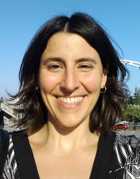21 Jun How Do We Retrieve Speech From Our 50,000 Word Mental Dictionary?
MedicalResearch.com Interview with:
Stephanie Ries, PhD
Assistant Professor
School of Speech, Language, and Hearing Sciences
Center for Clinical and Cognitive Neuroscience
San Diego State University
Director of the Laboratory for the Brain Dynamics of Language
San Diego, CA
MedicalResearch.com: What is the background for this study? What are the main findings?
Response: Our study is about how we retrieve words when we speak. We routinely do this rather effortlessly. Healthy adults can produce about 2 to 3 words per second selected among over 50,000 words in our mental dictionary. However, the neural mechanisms allowing us to do so are not well known. This process relies on two complementary mechanisms: the activation of words, and the selection of words. Our study shows that these mechanisms co-occur in time: meaning one does not end when the other starts, and in space: some brain regions, such as the posterior inferior temporal gyrus, support both mechanisms sequentially.
We were able to get an unprecedented look into the neural underpinnings of this process by studying brain activity recorded directly at the cortical surface in patients undergoing intracranial EEG monitoring for intractable epilepsy. While these patients were monitored, we asked them if they would agree to participate in our study, which consisted in naming pictures for about 10 minutes. Most of the time, they agreed. We were then able to analyze the intracranial electrical signal in relation to the pictures that were named. Such occasions are extremely rare.
MedicalResearch.com: What should clinicians and patients take away from your report?
Response: One of the main messages is that, although we like to simplify how the brain works by attributing one function to one brain region, reality is probably more complex. Our study shows that for sub-mechanisms involved in word retrieval. We believe that the fact one brain region can be involved in more than one cognitive function facilitates word retrieval.
MedicalResearch.com: What recommendations do you have for future research as a result of this study?
Response: The main recommendation is to embrace complexity! And to continue researching how word retrieval is enabled within local neuronal ensembles and through interactions between distant brain regions.
Although the ease with which we retrieve words in our everyday lives can be taken for granted, many people suffer from word finding difficulties or anomia. Anomia is the number one complaint of patients with stroke-induced aphasia and is also common in neurodegenerative disorders and normal aging. Therefore, understanding the neural mechanisms underlying word retrieval is of critical importance so we can better understand how it can break down.
MedicalResearch.com: Is there anything else you would like to add?
Response: I would like to thank my colleagues for their invaluable insights and for helping make this research possible. But most of all, I want to thank the patients for their patience and extraordinary selflessness. Without them, none of this research would be possible.
MedicalResearch.com: Thank you for your contribution to the MedicalResearch.com community.
Citation:
Stephanie K. Riès, Rummit K. Dhillon, Alex Clarke, David King-Stephens, Kenneth D. Laxer, Peter B. Weber, Rachel A. Kuperman, Kurtis I. Auguste, Peter Brunner, Gerwin Schalk, Jack J. Lin, Josef Parvizi, Nathan E. Crone, Nina F. Dronkers, Robert T. Knight. Spatiotemporal dynamics of word retrieval in speech production revealed by cortical high-frequency band activity. Proceedings of the National Academy of Sciences, 2017; 114 (23): E4530 DOI: 10.1073/pnas.1620669114
Note: Content is Not intended as medical advice. Please consult your health care provider regarding your specific medical condition and questions.
Last Updated on June 22, 2017 by Marie Benz MD FAAD

